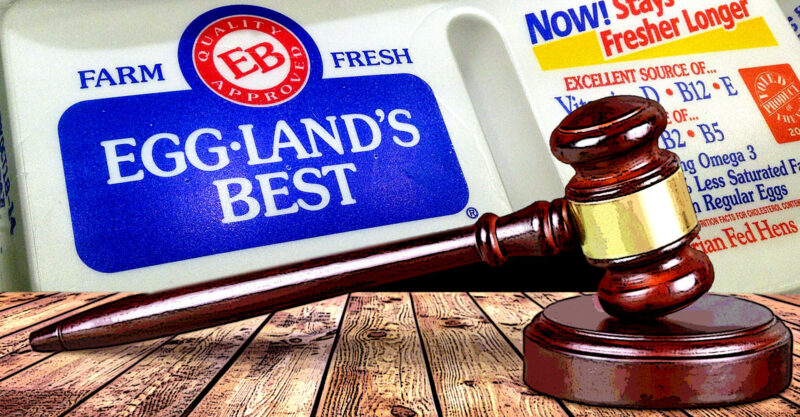Miss a day, miss a lot. Subscribe to The Defender's Top News of the Day. It's free.
Eggland’s Best, the second-largest U.S. egg producer, misled consumers about its packaging recyclability, animal welfare and nutritional superiority, according to a consumer advocacy group.
“We’ve been concerned that Eggland’s Best may be marketing what it calls ‘superior’ eggs when the nutritional claims about those eggs don’t hold up under testing,” Organic Consumers Association (OCA) National Director Rose Welch told The Defender.
“We’ve also identified representations that Eggland’s Best makes about the recyclability of its packaging and welfare of the egg-laying hens in its supply chain that we allege don’t comport with reality,” she said. “These types of claims matter to consumers, and they shouldn’t be made if they are misleading or untrue.”
In a lawsuit filed March 14 in the Superior Court of the District of Columbia, OCA challenged Eggland’s claims that its eggs contain “superior nutrition” compared to “ordinary eggs,” and that they have fewer calories, less cholesterol and less total fat.
The complaint alleges that independent investigations by other groups and commissioned by OCA attorneys found Eggland Best’s eggs don’t have fewer calories, less fat or cholesterol as the company claims and are therefore not “nutritionally superior.”
OCA also disputed the popular brand’s claim that its “flocks are always handled … humanely,” and that “space requirement in cages … are adequate for normal function and behavior.”
The consumer group cited Eggland’s own statements that its hens are raised in conventional caged systems. OCA also said such systems are not humane and the American Veterinary Medical Association has determined that they restrict normal, comfortable and healthy functioning for hens.
An undercover investigation by the Humane Society also documented “extreme cage confinement” at an Eggland’s-affiliated facility.
According to OCA, Eggland’s Best falsely claims its packaging is delivered “in the most environment-friendly way” in polystyrene cartons that are “recyclable” and accepted by “more and more communities … in their recycling programs.”
Most recycling programs don’t accept polystyrene materials, which take approximately 500 years to decompose, OCA said. In fact, polystyrene is so environmentally unfriendly that many cities and states have banned its sale entirely.
False product claims about issues consumers care about mislead them and affect their decision-making when they seek out — and choose to pay more for — products they believe are better for their health, more humane and more environmentally sustainable, plaintiffs contend.
OCA alleges Eggland’s Best violated the District of Columbia’s Consumer Protection Procedures Act. The nonprofit, which asked the court for an order mandating an end to the egg producer’s deceptive marketing practices, said it is not seeking monetary damages.
Eggland’s Best’s eggs are produced on licensed farms across the country. The company did not immediately respond to The Defender’s request for comment on the lawsuit.
The same week OCA sued Eggland’s, Richard Vilchis, a Chicago consumer, filed a class action lawsuit against the company in federal court challenging Eggland’s claim on its packaging that its eggs contain “25% less saturated fat than regular eggs,” Reuters reported.
Vilchis had the eggs independently tested and found they contained 2.84 grams of saturated fat per 50-gram serving — not the 1 gram the company claims. He alleged that such “false, misleading, and deceptive” marketing claims deceived consumers into paying more for their eggs.
The complaint seeks unspecified damages for egg purchasers for violations of Illinois laws against consumer fraud and deceptive trade practices.
Plaintiffs in both cases are represented by the Richman Law & Policy law firm, a food issues-focused law firm whose mission is to hold large corporations accountable for damaging public health and the environment.
The cases are part of a recent upsurge in litigation against food and beverage companies fighting against what advocacy groups describe as a spike in deceptive marketing practices by Big Food corporations.
Misleading labels are designed to profit off of a growing consumer interest in healthy and environmentally sensitive consumption.
Many of these cases are class action lawsuits. Class action cases against Big Food have increased substantially over the last decade, reaching an all-time high of 331 cases filed in 2021 and hovering around an average of 200 for the last several years, according to research by law firm Perkins Coie.
This is not the first time Eggland’s Best has been accused of deceiving consumers with its advertising claims.
In 1994, the Federal Trade Commission took action against the company, prohibiting it from misrepresenting the nutritional content of its eggs and requiring it to have scientific substantiation for its claims.
In 1996, the commission disciplined the company again for continuing to produce ads making false claims about cholesterol. At that time, Eggland was assessed a civil penalty of $100,000.








